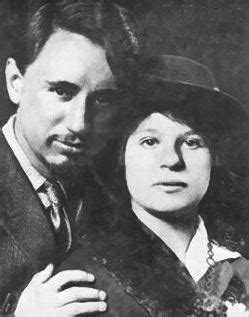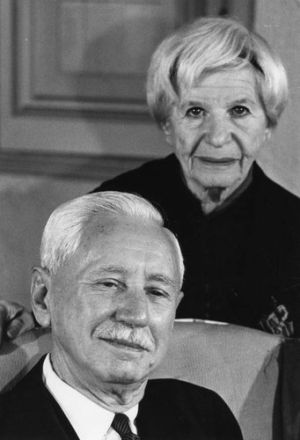Will Durant: Difference between revisions
No edit summary |
No edit summary |
||
| Line 8: | Line 8: | ||
The Durants were awarded the Pulitzer Prize for General Nonfiction in 1968 for ''Rousseau and Revolution'', the tenth volume of ''The Story of Civilization''. In 1977 they were presented with the Presidential Medal of Freedom by Gerald Ford, and Ariel was named "Woman of the Year" by the city of Los Angeles. The Durants received the Golden Plate Award of the American Academy of Achievement in 1976.<ref>[https://achievement.org/our-history/golden-plate-awards/ "Golden Plate Awardees of the American Academy of Achievement"]. www.achievement.org. American Academy of Achievement.</ref> | The Durants were awarded the Pulitzer Prize for General Nonfiction in 1968 for ''Rousseau and Revolution'', the tenth volume of ''The Story of Civilization''. In 1977 they were presented with the Presidential Medal of Freedom by Gerald Ford, and Ariel was named "Woman of the Year" by the city of Los Angeles. The Durants received the Golden Plate Award of the American Academy of Achievement in 1976.<ref>[https://achievement.org/our-history/golden-plate-awards/ "Golden Plate Awardees of the American Academy of Achievement"]. www.achievement.org. American Academy of Achievement.</ref> | ||
[[File:Durant and ariel in later life.jpg|thumb|William and Ariel in later life]] | |||
The Durants wrote a 420-page joint autobiography, published by Simon & Schuster in 1977 (cited by Vern Bullough above), entitled: ''A Dual Autobiography''. The couple remained married until death, and died within 2 weeks of each other, being buried next to one another at the Westwood Village Memorial Park Cemetery in Los Angeles, California. | The Durants wrote a 420-page joint autobiography, published by Simon & Schuster in 1977 (cited by Vern Bullough above), entitled: ''A Dual Autobiography''. The couple remained married until death, and died within 2 weeks of each other, being buried next to one another at the Westwood Village Memorial Park Cemetery in Los Angeles, California. | ||
[[Category:Official_Encyclopedia]][[Category:Censorship]][[Category:Art]][[Category:People]][[Category:People: American]][[Category:People: Deceased]][[Category:People: Adult or Minor sexually attracted to or involved with the other]][[Category:People: Artists and Poets]] | [[Category:Official_Encyclopedia]][[Category:Censorship]][[Category:Art]][[Category:People]][[Category:People: American]][[Category:People: Deceased]][[Category:People: Adult or Minor sexually attracted to or involved with the other]][[Category:People: Artists and Poets]] | ||
Revision as of 17:02, 8 February 2023

William James Durant (November 5, 1885 – November 7, 1981) or Will Durant, was an American writer, historian, and philosopher, best known for his books The Story of Philosophy (1926)[1] and the 11-volume The Story of Civilization (1935–1975), co-authored with his wife Ariel Durant.[2] Before becoming a writer, Durant taught at the libertarian Ferrer Modern School from 1911 to 1913, a school inspired by the anarchist pedagogy of Francisco Ferrer.[3] There, Durant met his future wife Chaya (Ida) Kaufman when she was 14 years of age. As described by historian Vern Bullough,
"Durant’s future wife, Ariel, had just turned 14 when she entered his classroom in the fall of 1912, and she immediately fell in love with him and set plans to marry him. By March of 1913, he had resigned his position because of his growing interest in her, and they were married October 31, 1913; she was just past 15 and he 28 (Durant and Durant, 1977)."
Bullough V.L. (1990). “History in adult human sexual behavior with children and adolescents in Western societies”, in Pedophilia: Biosocial Dimensions (Jay R. Feierman, ed.). New York: Springer-Verlag Publishers, pp. 71-72.[4]
Their wedding took place at New York's City Hall, to which she roller-skated from her family's home in Harlem. Durant nicknamed Kaufman "Ariel" after the character from Shakespeare's play The Tempest, a nickname given because - for Durant - she was "strong and brave as a boy, and as swift and mischievous as an elf".[5] His wife legally changed her first name to Ariel, and subsequently lived and published under this name. The couple had one daughter, Ethel Benvenuta Durant (1919–1986) and adopted a son, Captain Louis Richard "Lipschultz" Durant (1917–2008) who was the son of Ariel's sister Flora Kaufman Lipschultz and her former husband, Joseph Bernard Lipschultz (divorced in 1928).
The Durants were awarded the Pulitzer Prize for General Nonfiction in 1968 for Rousseau and Revolution, the tenth volume of The Story of Civilization. In 1977 they were presented with the Presidential Medal of Freedom by Gerald Ford, and Ariel was named "Woman of the Year" by the city of Los Angeles. The Durants received the Golden Plate Award of the American Academy of Achievement in 1976.[6]

The Durants wrote a 420-page joint autobiography, published by Simon & Schuster in 1977 (cited by Vern Bullough above), entitled: A Dual Autobiography. The couple remained married until death, and died within 2 weeks of each other, being buried next to one another at the Westwood Village Memorial Park Cemetery in Los Angeles, California.
- ↑ https://en.wikipedia.org/wiki/The_Story_of_Philosophy
- ↑ https://en.wikipedia.org/wiki/The_Story_of_Civilization
- ↑ https://en.wikipedia.org/wiki/Ferrer_movement
- ↑ The source given by Bullough is: Will and Ariel Durant, A Dual Autobiography (New York: Simon & Schuster, 1977).
- ↑ Mitgang, Herbert (October 28, 1981). "Ariel Durant, Historian is Dead; Wrote The Story of Civilization". The New York Times.
- ↑ "Golden Plate Awardees of the American Academy of Achievement". www.achievement.org. American Academy of Achievement.